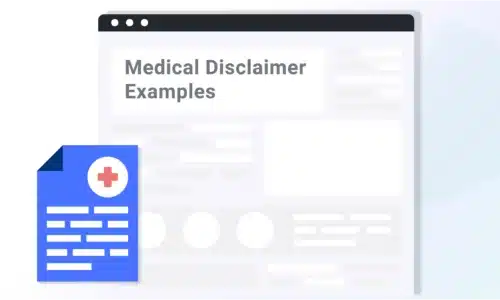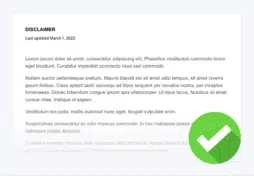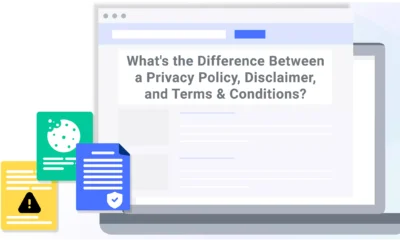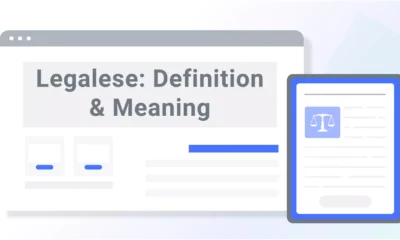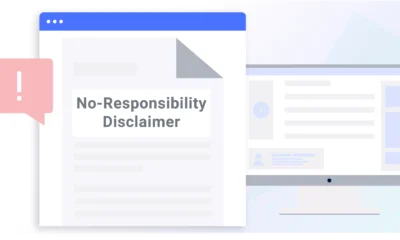If your website has content related to healthcare, medical practices, or fitness, posting a medical disclaimer can help reduce your legal liabilities.
A medical disclaimer declares that the content on your site is for informational purposes only and should not be considered professional medical advice.
In this article, learn more about what a medical disclaimer is, see some medical disclaimer examples, and get tips on how to write a medical disclaimer for your website.
How To Make a Medical Disclaimer
Let’s discuss how to make a medical disclaimer to fit your website’s unique needs.
Disclaimer Generator
The easiest way to customize a medical disclaimer for your site is to use our disclaimer generator, which helps you make a full disclaimer page for free.
Once you make it to the “Professional Disclaimer” section of the builder, click “Yes,” then select the “Medical/Health” option to generate a medical disclaimer.
It makes adding a medical disclaimer to your site incredibly easy, helps reduce your legal liabilities, and encourages users to make informed decisions about their health.
Disclaimer Template
You can also customize our disclaimer template with all information on your website related to your medical or health disclaimers and other liabilities.
Once you’re done, add the comprehensive disclaimer to a page on your site, then link to that page in places like your website footer.
It’s fast, simple, and effective.
Write One Yourself
You can also write your medical disclaimer but be mindful not to leave out any vital details.
To write a standard medical disclaimer, do the following:
If applicable, clarify that using your site or app does not establish doctor-patient relationships.
What Is a Medical Disclaimer?
A medical disclaimer explains that the content on your site is for informational or educational purposes only and does not substitute professional medical advice or consultations with healthcare professionals.
Posting a medical disclaimer warns users that reliance on or using the information on your website is at their own risk.
Medical disclaimers help reduce legal liabilities in case your content directly or indirectly causes harm to readers and help those readers make more informed judgments about your content.
Different types of medical disclaimers that address specific healthcare liabilities include:
- Medical advice disclaimers
- Health disclaimers
- Confidential email disclaimers
- “I am not a doctor” disclaimers
- Medical disclaimers for fitness programs
In addition to stating that a site does not offer medical advice, a medical disclaimer may include other specific details or suggest related resources for users to seek out.
Medical Disclaimer vs. Health Disclaimer
Although medical and health disclaimers are similar, one might be better for your site, depending on if your content is more closely related to health or medical practices.
- Medical disclaimers are used when the site content may be mistaken for medical advice.
- Health disclaimers are used when the advice or recommendations on the site may lead to potential health risks.
You can often find medical disclaimers on the following websites:
- Hospitals
- Pharmaceutical companies
- Healthcare organizations
Health disclaimers are often featured on:
- Health blogs
- Gym websites
- Fitness program websites.
Who Needs a Medical Disclaimer?
Medical disclaimers aren’t just for hospital or pharmaceutical websites — any site that directly or indirectly provides information users may perceive as medical should have one.
While it’s not legally required, posting one reduces your liabilities and ensures your visitors are properly informed.
You should publish a medical disclaimer if your site focuses on any of the following:
- Health or fitness
- Gym or fitness training
- Sports-related advice
- Dietary information
- Homeopathic remedies or information
Medical Disclaimer Examples
To better understand how medical disclaimers work, let’s go over several examples of medical disclaimers from organizations and businesses in the healthcare industry.
Medical Advice Disclaimer
For a good example of a generic medical advice disclaimer, let’s look at the one posted on the Axia Women’s Health website, pictured below.
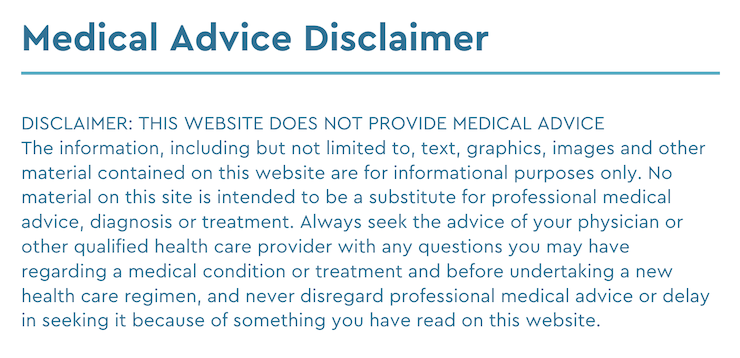
It clearly states that the site content is provided for informational purposes only and does not intend to substitute professional medical advice, diagnosis, or treatment.
If your site includes content users may misconstrue as medical advice, add a similarly worded medical advice disclaimer like the one above to clarify that it’s purely informational.
You might also direct readers to seek medical advice from qualified healthcare professionals, such as physicians or medical specialists.
“I Am Not a Doctor” Disclaimer
If you create content related to healthcare or medicine but don’t directly work in the field, add an “I am not a doctor” disclaimer to your website so users can adequately judge the credibility of the information.
A good example of this type of disclaimer comes from the Sleep and Wellness Coach’s website, shown in a screenshot below.
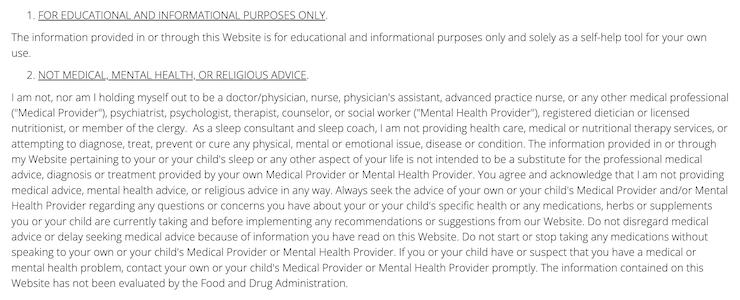
Their disclaimer states that the site owner is not a doctor or other medical professional.
It also specifies that the site content only pertains to sleep-related issues and does not constitute professional medical advice, diagnosis, or treatment.
Medical Disclaimer for a Blog
The nursing blog Tips From Tori includes a medical disclaimer declaring that the site information is for educational and informational purposes only and does not constitute medical advice.
It also specifies that using the site content does not establish patient-client relationships, as shown in the screenshot below.

Even though the site owner is a nurse by profession, adding a medical disclaimer reduces her liabilities for any potential issues arising from using her content.
If you’re a healthcare professional, it’s best to include a medical disclaimer on your blog because your advice or information may not apply to every reader and may cause harm.
It’s important to advise readers not to rely solely on the information provided on the site and to seek consultations from healthcare professionals to receive personalized advice or treatment.
Medical Disclaimer for Fitness Programs
Because fitness and exercise programs can also impact users’ health, medical disclaimers are often on fitness websites.
For example, personal trainer Christina Carlyle includes a medical disclaimer on her website stating that fitness programs and other site content are intended for informational and educational purposes only.
As shown in the screenshot below, the disclaimer advises users to consult a physician before starting fitness programs.
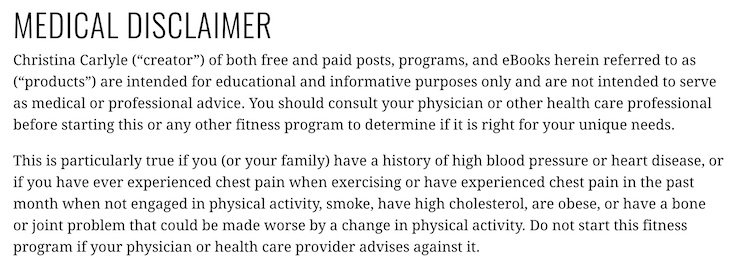
Her disclaimer warns users of the potential risks of participating in these programs, especially for those with existing health conditions.
If you offer a fitness program, include a medical disclaimer like the example above and tell users to follow the advice of their healthcare providers before starting any exercise programs.
Where Should You Display Your Medical Disclaimer?
You should display your medical disclaimer throughout your website so users can easily find and read it.
Plan to put it in all of the following spots:
- Link to all disclaimers in the footer of your website
- Add it as a clause in your terms and conditions agreement
- Put a link to it in your privacy center or legal page if you have one
If you write an article or a blog, consider adding it as a note at the end of the content, so it’s directly on the page that features the details some people might confuse as medical advice.
Medical disclaimers are short but vital disclosures that protect your business and help keep your users safe. Use Termly’s free disclaimer generator to quickly create a custom medical disclaimer that helps your site clearly communicate the limits of your content.

